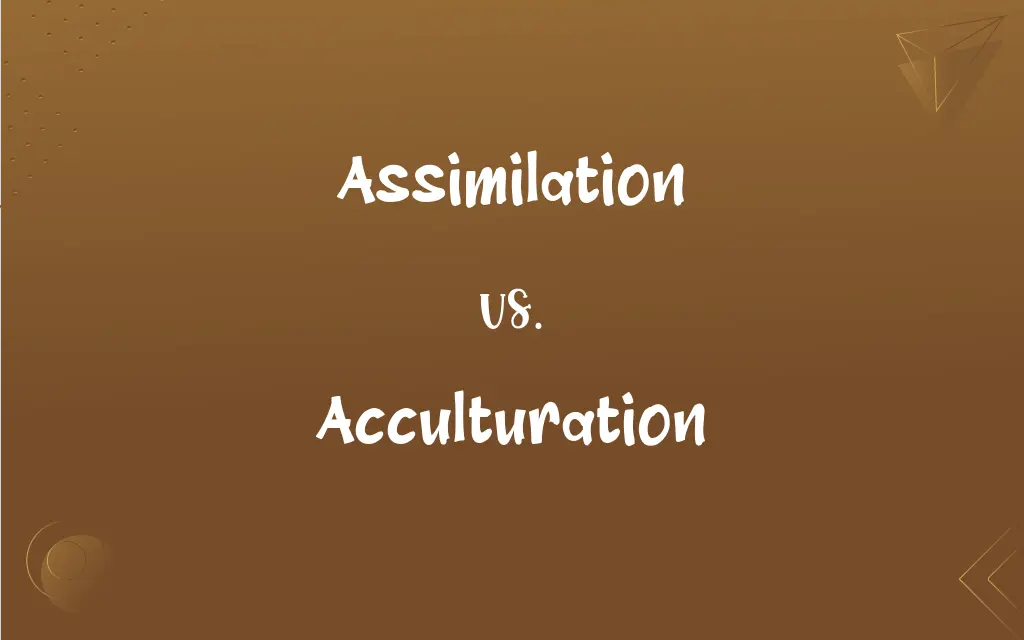Assimilation vs. Acculturation: What's the Difference?
Edited by Aimie Carlson || By Harlon Moss || Updated on October 10, 2023
Assimilation involves adopting a new culture and losing original cultural traits, while acculturation involves adopting new cultural traits while maintaining aspects of the original culture.

Key Differences
In the context of sociocultural dynamics, assimilation denotes a process wherein an individual or group adopts the characteristics of another culture, often subduing their own cultural traits in the process. Acculturation, meanwhile, entails adopting features of another culture but without completely forsaking original cultural elements. In essence, assimilation leans towards a one-sided cultural adoption, while acculturation suggests a blend of cultural elements.
Considering assimilation, one observes a definitive transition towards a dominant culture, possibly losing the original cultural identity entirely. Acculturation, conversely, does not demand the relinquishment of one’s initial cultural framework. Thus, where assimilation implies total submersion into a new cultural entity, acculturation presents a multicultural aspect, embracing new while retaining the old.
When it comes to the impact on individual identity, assimilation often results in the fading away of original cultural identification and a full embrace of the new cultural norms. In contrast, acculturation allows individuals to explore and adopt new cultural facets while preserving their original cultural identity. Hence, assimilation molds a uniform identity, while acculturation nurtures a diverse and multifaceted cultural identity.
In social contexts, assimilation might be seen as a pathway to resolve cultural clashes by absorbing one culture into another, thereby eliminating noticeable differences. Acculturation, in opposition, appreciates and acknowledges cultural diversity, enabling varied cultural traits to coexist. Consequently, assimilation can lead to cultural homogeneity, while acculturation often fosters an environment of cultural diversity.
Comparison Chart
Cultural Retention
Little to no retention of original culture.
Retention of original cultural traits is common.
ADVERTISEMENT
Identity
Forms a uniform identity with the adopted culture.
Maintains a diverse identity, blending cultures.
Dominant Culture Role
Often requires conformity to dominant culture norms.
Does not necessitate full conformity to another culture.
Integration Level
High level of integration into the new culture.
Partial integration, maintaining some cultural distance.
Diversity
Leads to reduced cultural diversity.
Encourages and sustains cultural diversity.
Assimilation and Acculturation Definitions
Assimilation
In linguistics, assimilation refers to the process wherein sounds become similar to neighboring sounds in speech.
In rapid speech, handbag [hæmbæg] demonstrates assimilation as the 'n' sound changes to 'm' due to the following 'b'.
ADVERTISEMENT
Acculturation
Acculturation can describe the phenomena wherein minority cultures adapt or modify aspects due to continuous contact with a dominant culture.
The acculturation of Native Americans involved integrating aspects of European settlers’ practices while also maintaining various indigenous traditions.
Assimilation
Assimilation refers to the process by which a person or group adopts the customs, attitudes, and norms of a different cultural group.
After moving to the USA, Hiroshi experienced assimilation, gradually celebrating Thanksgiving with as much enthusiasm as any local.
Acculturation
Acculturation is the mutual influence that two cultures have on each other when coming into direct contact.
The introduction of Italian pasta to American cuisine represents acculturation, melding Italian culinary traditions with American dietary habits.
Assimilation
Assimilation can describe the biological process where substances (nutrients) are absorbed and integrated into an organism.
Plants perform assimilation by absorbing sunlight and converting it into energy via photosynthesis.
Acculturation
Acculturation can also highlight the dynamic process of cultural adjustment and adaptation between distinct cultural entities.
The widespread use of English words in modern French, such as le weekend, exemplifies acculturation in the French language due to global English influence.
Assimilation
In psychology, assimilation refers to incorporating new experiences into existing mental schemas without changing them.
In Piaget's theory, when a child learns to call all four-legged animals 'dogs', they are exhibiting assimilation by fitting new experiences into existing categories.
Acculturation
Acculturation refers to the process of adopting elements of another culture while maintaining original cultural traits.
Lisa displayed acculturation by celebrating both her native Diwali and adopting the local tradition of Halloween.
Assimilation
Assimilation can also refer to the process of comprehending and integrating new information into existing knowledge.
As Sally learned about marine life, she experienced assimilation by connecting new facts about coral reefs to her existing knowledge about oceans.
Acculturation
In social science, acculturation describes the changes in cultural and social aspects resulting from contact between cultural groups.
The global popularity of sushi reflects acculturation, as non-Japanese people have embraced this traditional Japanese dish while adding localized variations.
Assimilation
The act or process of assimilating.
Acculturation
The modification of the culture of a group or individual as a result of contact with a different culture.
Assimilation
The state of being assimilated.
Acculturation
The process by which the culture of a particular society is instilled in a human from infancy onward.
Assimilation
(Physiology) The conversion of nutriments into living tissue; constructive metabolism.
Acculturation
A process by which the culture of an isolated society changes on contact with a different one.
Acculturation
A process by which a person acquires the culture of the society that they inhabit, starting at birth.
Acculturation
The adoption of the behavior patterns of the surrounding culture;
The socialization of children to the norms of their culture
Acculturation
All the knowledge and values shared by a society
Acculturation
The process of assimilating new ideas into an existing cognitive structure
FAQs
What is assimilation?
Assimilation is the process of absorbing and fully adopting a new culture, often at the expense of one's original cultural identity.
What is an example of acculturation?
An example is an immigrant celebrating both their native country’s holidays and those of their new country, blending cultural practices.
Can assimilation be reversed?
It can be challenging to reverse, especially when original cultural traits have been significantly subdued or eradicated.
Can assimilation be forced?
Yes, forced assimilation occurs when an individual or group is coerced into adopting a new culture, often seen in historical and political contexts.
How does acculturation differ from assimilation?
Acculturation involves adopting elements of another culture while retaining aspects of the original culture, unlike assimilation, which often involves subsuming the original culture.
Can assimilation occur without acculturation?
Yes, assimilation can occur without acculturation when an individual or group completely adopts a new culture without retaining any original cultural elements.
Can acculturation affect language?
Yes, acculturation often leads to bilingualism or the blending of languages, as individuals adopt a new language but also retain their native tongue.
Can assimilation be partial?
While assimilation typically involves full cultural adoption, partial assimilation can occur, with selective adoption of certain cultural aspects.
What is cultural assimilation?
Cultural assimilation is when an individual or group fully adopts the beliefs, customs, and practices of another culture, often losing aspects of their original culture.
Can acculturation happen without direct contact between cultures?
Generally, no—acculturation typically requires direct contact between cultural groups, facilitating exchange and adaptation of cultural elements.
How is acculturation studied?
Acculturation is studied using various methods, including sociological research, psychological studies, and historical analysis of cultural interactions.
What is the end goal of assimilation?
Assimilation seeks to completely integrate an individual or group into a new cultural context, often diminishing the original cultural identity.
Is acculturation a two-way process?
Yes, acculturation often involves mutual cultural exchange, wherein both interacting cultures are influenced and altered to some extent.
What are the outcomes of assimilation?
Outcomes of assimilation may include loss of original cultural identity and full alignment with the adopted culture’s norms and practices.
What factors influence assimilation?
Factors can include sociopolitical pressures, economic opportunities, and personal willingness or resistance to adapt.
How does acculturation influence society?
Acculturation can lead to multicultural societies where diverse cultural practices, beliefs, and languages coexist and interact.
What are the models of acculturation?
Various models include assimilation, integration, separation, and marginalization, each representing different responses to cultural contact.
How does acculturation affect identity?
Acculturation can lead to a blended cultural identity, where individuals incorporate elements of both their original and new cultures.
Is assimilation a conscious process?
It can be both conscious and unconscious, involving deliberate efforts to adapt and unintentional adoptions of cultural traits.
Does acculturation involve power dynamics?
Often, yes—acculturation can be shaped by power dynamics, especially when one culture is dominant or exerts more influence over another.
About Author
Written by
Harlon MossHarlon is a seasoned quality moderator and accomplished content writer for Difference Wiki. An alumnus of the prestigious University of California, he earned his degree in Computer Science. Leveraging his academic background, Harlon brings a meticulous and informed perspective to his work, ensuring content accuracy and excellence.
Edited by
Aimie CarlsonAimie Carlson, holding a master's degree in English literature, is a fervent English language enthusiast. She lends her writing talents to Difference Wiki, a prominent website that specializes in comparisons, offering readers insightful analyses that both captivate and inform.































































